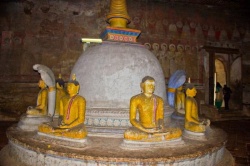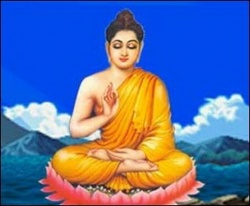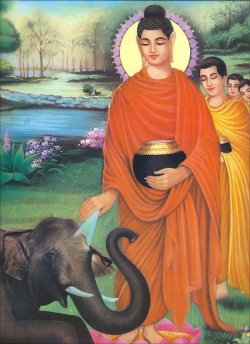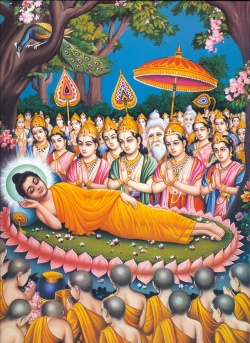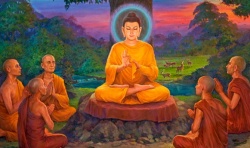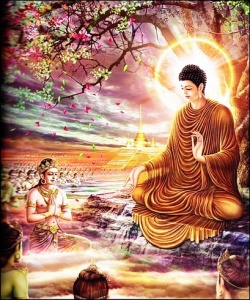Is There a Soul in Buddhism?
Prefatory Note: This essay came out of a talk given in Toronto some years ago. Some of the people attending were interested in the ideas and asked if I could give them some kind of written summary of the arguments presented. The following is the result.
The hosts of the talk had chosen a topic I found somewhat odd; "The Soul in Buddhism" and I used it to examine some issues related to the nature of mind, karma, rebirth and Buddhist Middle Path philosophy.
This essay has since been published in the "Right View Quarterly"
Footnotes to the text are hyper-linked.
By Punnadhammo Bhikkhu
To give the short answer first: "No."
As you might expect, the long answer is much more nuanced. The short answer depends on the commonly understood idea of "soul" as an unchanging personal principle that continues in time infinitely. This is the concept of "soul" usually implicit when one begins with the assumptions of a theistic religion. On the other hand, if by soul we mean simply that human beings have a spiritual aspect that is not ultimately bound up with physical processes, then Buddhism would be much more sympathetic to the idea. Buddhism may deny the existence of a "soul" but it is not for that reason "soul-less" in the same way as is materialist philosophy.
Buddhism is often called the "Middle Path." This has been explained in different ways in different contexts. The earliest use of the phrase is found in the Buddha's very first sermon, in which he laid out the "middle way" between the extremes of asceticism and hedonism. On the metaphysical level, the Buddhist doctrine (and more specifically the dependent origination) has been called the "middle way" between the extreme views of eternalism and annihilationism (sassatavada and ucchedavada).
The first sutta of the Digha Nikaya lays out sixty-two false views, or philosophical errors. These make a complex matrix of nuanced positions regarding metaphysical questions but we can simplify them all into two broad categories, (and one additional minor category.) The first major category of error is eternalism, or the belief that there are some "things" (such as a soul) that continue essentially unchanged forever. This was represented in the Buddha's time by all those Indian schools which postulated an eternal "atman", the Self or Soul or "jiva", life-principle. In later times, this philosophy was adopted in some form or another by all the theistic religions like Christianity, Islam or most forms of Hinduism.
The belief in an atman or soul in this sense usually goes hand-in-hand with the belief in a Creator-God, who is the first, most perfect and most powerful of the "souls". Sometimes the soul is seen as a part or a spark of the One Big Soul, as in the Upanashadic idea that Atman equals Brahman. Sometimes the human soul is seen as a separate entity created by God with an act of will. There are other variations on this theme. In any case, the idea of a God as First Principle or Creator would seem to be required once we accept the notion of an essential and eternal soul. The question of where these souls come from can only be answered by tracing them back to a first cause. The inquiry must end in an act of creation by a special ontologically privileged great-soul.
The opposite extreme view is annihilationism, which is a nearly literal translation of ucchedavada (the "cutting-off" view). This, in its simplest formulation, is the view that beings are "cut off" at death and utterly cease to exist. In the Buddha's time this was represented by various philosophies that either postulated the existence of a finite "life-principle" or took a hard-materialist line that denied any separate reality apart from the body.
In western philosophy, this view was developed by some of the stoics and has never completely died out. Today, in the form of so-called rationalism or philosophical materialism it is becoming established as the dominant world-view of the educated classes. On the metaphysical level, it is represented by what is called "physicalism, " the argument that all mental functions are in the last analysis dependent on physical processes. As a corollary, this would mean that such processes are also explicable in purely physical terms, i.e. as specific sequences of firing neurons.
Such a view of course presupposes atheism; there is neither room nor need for a God in such a philosophy. Likewise, it rejects completely any idea of a life after death, and tends to be extremely skeptical about what are called paranormal phenomena like telepathy or precognition.
It can be seen that one of the principle differences between these two philosophic tendencies is on the question of the "Great Matter" of life and death. One believes in a separate soul that continues forever, the other believes only in physical reality and denies any kind of post-mortem existence. They would seem to be completely irreconcilable polar opposites, and in most respects they are. However, from the point-of-view of Buddhism they both share one underlying false assumption.
Before we get to that, it is necessary to explain something of the Buddhist view. The Buddhists have made the claim that they are the Middle Path between both of these erroneous extremes and have presented the Master's doctrine of the Dependent Origination as a middle-way cutting across the thickets of views. The Dependent Origination is a complex study, as it has many aspects in different contexts. Nevertheless, the core idea is simple, but subtle and profound. The general principle of Dependent Origination is that things arise from causes and not otherwise. "This arising, that must be. This ceasing, that must cease."
Stated baldly like this, it seems almost a truism; but the implications are far-reaching. It is a radical statement of the lawful nature of the universe. It says there are no exceptions to the Laws of Cause and Effect. (This is not a complete statement, as we will see later when we consider the very special case of the Unconditioned.)
We'll have much more to say about this axiom of Buddhism, but first let us make a note that both of the extreme views, as opposite in most respects as day and night, share this salient characteristic; they ultimately deny cause-and-effect and fall back on arbitrariness. In the eternalist view the chain of cause-and-effect is explicitly traced back to a First Cause, a Primum Mobile, which is in most formulations some version of a Creator-God who creates by an act of arbitrary will. The final answer to why the universe is the way it is and not otherwise is that God did it that way.
The materialist or annihilationist view also falls back on an arbitrary principle, as it ultimately rests on randomness. Things are this way just because that is the way things are. The ultimately arbitrary nature of this view is seen in many instances. In the Big Bang model of the universe, for instance, there is an outstanding problem of "broken symmetry." The universe did not continue to expand into a universally diffuse soup of particles as would be expected by a strict application of cause-and-effect, instead the initial symmetry was somehow randomly (arbitrarily) broken and matter "clumped" into galaxies, stars and planets.
As an historical aside, western science has always had an uncomfortable relationship with this arbitrary principle. The entire intellectual basis of science is predicated on seeking and explaining the laws of cause-and-effect. Before the middle of the nineteenth century, most scientists were comfortable with falling back on divine creation as the ultimate arbitrary first cause. Newton, for example, was very much a creationist and even maintained that God would intervene from time to time to keep the planets in their orbits. (Which we now know are actually chaotic - i.e. extremely complex non-repeating patterns, neither random nor regular)
It was only with the advent of quantum mechanics that creationism was explicitly replaced with randomness. In fact, some thinkers today use quantum mechanics to justify the idea that the universe is inherently random. This is actually a misunderstanding. For instance, Heisenberg's Uncertainty Principle maintains that certain fundamental quantities are inherently unpredictable, which is not at all to say that they arise without cause-and-condition. Most of the metaphysical arguments from Quantum Mechanics confuse the laws of quantum physics with their various interpretations. The former are mathematical rigorous and experimentally verifiable, while the later are philosophical attempts to explain how the universe might work according to those laws. We will have a little more to say about Quantum Mechanics later, in relation to the topic of the nature of Mind.
To recap the argument so far, we can divide the world of metaphysical thought into that camp which believes that sentient beings are possessed of an immortal soul created by the arbitrary will of a God and those who believe sentient beings are nothing more than a complex arrangement of molecules arisen in the last analysis by pure chance. In the middle of these extremes, we have the third camp, the Buddhists who believe that beings arise according to laws of cause-and-effect and deny that there is any arbitrary or random aspect whatsoever.
The Buddhist writer and translator, Maurice Walshe, once came up with a very evocative metaphor for this situation. He said that the Buddhist Middle-Way is like an island in the middle of a round lake. There is an optical illusion such that from either shore, the island always appears closer to the further shore. Likewise, to the eternalist, Buddhism must always seem hopelessly nihilistic in its denial of Soul and God. This is in fact the argument presented by the official Vatican theologians against Buddhism. On the other hand, a modern "scientifically" minded atheist looks at Buddhism as being hopelessly mystical with it's talk of karma, rebirth, other realms and so on. To him, the island appears just a short passage from the eternalist shore.
Before proceeding to an attempt to develop the implications of the Buddhist idea of Dependent Origination, we should tie up one loose end. The alert reader may have noticed that I mentioned a third minor category of false view which does not fit neatly into the two broader camps. I was referring to the so-called "eel-wriggler's" view (literal translation.) This is the view of the person so caught up in the hindrance of skeptical doubt that they are unable to take a position anywhere on either shore or on the island but end up flopping about in the lake like eels. Nowadays this position attempts to gain some respectability by calling itself "agnostic. The Buddha was quite dismissive of this position in the Brahmajala Sutta. He characterized them as saying "I don't say this, I don't say that and I don't say the other thing," and put their position down to either stupidity or cowardice.
Nowadays there is a strong movement towards an "agnostic Buddhism" which retains extreme skepticism toward such doctrines as karma and rebirth. The proponents of this position justify it with very selective quotations from the suttas. In particular, the Kalama Sutta is often cited which says in part that one should not subscribe to a view because of tradition or hearsay, (and also because of having been "hammered out with reason" although this is less often cited.) However, if we read the sutta through to the end the Buddha lists reasons by which we should subscribe to a view; if we find it contributes to our spiritual growth, and if it is commended by the wise.
This is significant because Buddhism is first and foremost practical. It takes its stand less on metaphysical truth (although that shouldn't be downplayed) but more on the practical means of transcending suffering. Agnosticism fails in this because it gives one no place to stand. Skeptical doubt is listed as a hindrance, and compared to wandering in the desert without a map.
More could be said on this topic, which is not unimportant, but to return to our main theme - having discussed the two polar false views, we must now turn to the Buddhist Middle position.
We have seen that the primary metaphysical axiom of Buddhism is that things arise according to causes and conditions and not otherwise. I do not know if it is possible to establish this point with absolute philosophical rigour or not. It does seem to me to be intuitively true and I do not know of any unimpeachable counter-examples. (I have already said that so-called Quantum randomness does not qualify since that is not a statement of fact but just one possible interpretation of the data. Again, I would like to defer this point until we get to the topic of Mind.)
It is a trivial observation to say that the universe is mostly lawful, that it is subject to cause-and-effect. This is why science is possible at all. Two atoms of hydrogen joined to one atom of oxygen always make water and never gold or silicon. However, the Buddhist principle goes much further than this and makes the strong claim that everything arises according to causes. There is no random arising, nor random cessation.
Consider a universe where this were not so. There would be a fundamental underlying meaninglessness and on the human level, a final hopelessness. Since Buddhism is, as I have said, a practical philosophy, and also a hopeful one it cannot take it's basis on such a view of the universe. We need to start our inquiry somewhere, and this point needs to be taken as axiomatic for the rest of my argument to make sense. If you cannot follow me this far, the rest of what I have to say will not be convincing.
Another way of saying this is to restate the First Noble Truth and its associated task. The Buddha said this existence is marked with suffering (dukkha) and that we should, and can, understand it. He would not have given us the charge to understand it (it being in the last analysis all conditioned reality) if it were not understandable, if he had himself not understood it. Moreover, it could not be understood if it were random or arbitrary. So again, the whole teaching turns on this single point.
Now it is necessary to make another longish digression, to establish what Buddhism says about the nature of Mind, before we can apply this axiomatic rule of causation.
The nature of Mind is of course a central concern of Buddhism. Many of the texts and traditions can seem very mystical or cryptic, but if we turn to a very early attempt at intellectual rigour, the Abhidhamma, we can get some clear principles established to work with. Abhidhamma is a collection of texts from a very early phase of Buddhist thought. Traditionally the core passages, the matika, are attributed to the Buddha himself. Modern scholarship casts doubt on this tradition, but no one disputes that the Abhidhamma is very ancient. In structure and method they are very precise and rigorous texts which classify the elements of body and mind and their relationships.
The Abhidhamma recognizes four basic categories of reality: Rupa, Citta, Cetasika and Nibbana. That is, in English, body or physical matter, mind per se or consciousness, con-comitant mental factors arising with consciousness like thought or memory etc. and finally sui generis, Nibbana (nirvana) the unconditioned, a special class outside the rest.
Leaving the last aside for now, it is important to understand that each of the other three can be considered as ontologically primitive categories. That is to say, each has it is own irreducible reality. Consciousness for example can be explained neither in terms of matter nor vice-versa. The elements of each class may act upon each other in some circumstances. If it is cold in the room where I am sitting, the physical reality may be one causal factor in my mental feeling of distress. Nevertheless, for that feeling to exist at all cannot be explained solely in physical terms.
This position may require some justification. These days one of the dominant paradigms is the computational model of mind. This maintains that mind is a secondary phenomenon derived from purely physical processes in the brain. This model has strong appeal because as a culture we are so fascinated by our own creation, the electronic computer, and the way it can appear to mimic many mental functions.
Thick books have been written on both sides of this debate, which shows no sign of going away. Personally, I believe that physicalism can be refuted by a few moments of honest introspection. Consider the simple fact of "knowing. Not the process of knowing any-thing in particular, but the raw fact of just knowing in and of itself. All our perceptions and imaginations can be analyzed into process of sense organ, nerves and neurons but they all end up at this irreducible pristine simplicity. There is something at the end of the chain that "just knows." This immediate knowing, consciousness per se, is so simple, immediate and uncompounded that it cannot be explained in terms of any algorithm (step by step process.)
This last is of critical importance. If consciousness were a result of physical processes, we should be able (at least in theory) to explicate it step-by-step. It would need to be algorithmic. This is especially and obviously true for any computational model of mind. Any computational process can, in theory, be reduced to a series of simple and linear programming commands (the concept of the Turing machine.) There is simply no way to program something that is in itself immediate and perfectly simple. Consciousness does not make sense unless it is considered sui generis.
This way of understanding mind should not be confused with what western philosophy calls "substance dualism" or the "ghost in the machine." That is the eternalist soul view all dressed up for polite company. It is also, paradoxically, a sort of materialism. It assumes that there must be some "stuff" to comprise mind. Buddhism emphatically denies this. Mind is void.
We are trapped here by our own linguistic limitations. We are forced to use nouns like "mind" and "consciousness" to talk about this at all. However, nouns subtly imply some thing. Mind is not a thing at all. It would be better to use verbs like "knowing" exclusively if that did not trip us up in hopeless circumlocutions. Better to use the conventions of speech, but not to be fooled thereby.
So, mind, in the Buddhist understanding, is a separate irreducible class separate from body (and from mental concomitants but we need not digress that far from the main line of argument.) It is however, causally arisen and conditioned. In other words, subject to cause-and-effect like everything else. It is also, most of the time, intimately bound up with a physical body, which can act as one of the causal factors. Fill the bloodstream with alcohol and the conscious mind is dulled and bewildered because its physical correlate is not functioning normally. Likewise, mind can be a causal factor for body, and every time I move my limbs I demonstrate this.
One of the principal themes of Abhidhamma is an analysis of how specific mind-moments succeed in each in a causal chain. This is an application of the Buddhist law of impermanence, or the momentary nature of reality. Each moment consciousness arises to take an object. The process then repeats again and again ad infinitum in very specific patterns, which constitute the processes of perception and thought.
Now, each individual mind-moment of consciousness has a network of causes. It does not arise randomly. These can include the physical condition of the body, external sense data or internal mental concomitants. It always includes as a necessary cause the previous moment of consciousness. For example, I am watching an LCD screen as I type this. I may watch the screen for many subsequent moments, the previous moments and their objects conditioning the next arising consciousness to alight on the same or an adjacent object.
Mind then is momentary, unitary, void and subject to causes and conditions. A moment of consciousness, like everything else, cannot arise without causes, just randomly. This would violate the axiomatic rule of dependent arising. It would also constitute a case of creation ex nihilo, which is an extreme example of the arbitrary principle we have rejected.
This brings us to the very important topic of rebirth. It is sometimes seen as a contradiction that Buddhism teaches void nature (no-self) and yet maintains rebirth as a reality. If you have followed my argument so far, the next step is to establish that rebirth is a necessary consequence of the principle of causality. This is because the first moment of consciousness arising in a being in the womb also cannot be a creation ex nihilo. It must arise from prior causes, which must include a previous moment of consciousness.
The seeming paradox that there is rebirth but nothing is reborn arises from a misconception about this very life. Nothing in fact continues from moment to moment in the course of an ordinary day. It is just a causally connected series of mind-moments arising to various objects. What occurs at death is different only in that the physical base, the body, is no longer functional so the mind seeking an object is forced to re-arise elsewhere, with a new form as determined by its karma.
The "specific dependent origination" describes how this process occurs, in some detail. This is a list of twelve nidanas or stations, which demonstrate the specific playing out of the universal law of cause-and-effect in the case of sentient beings. It is said to be a description of "how this whole mass of suffering comes to be."
The first station listed (for purposes of discussion only, the process is cyclic and there is no "first cause" in Buddhism) is ignorance. Because the mind is ignorant of higher reality, it takes action in the world, which is karmic formation, the second stage.
It is worthwhile at this point to say something about karma. ("Kamma" in Pali) Karma in Buddhism means "volitional action." It is best understood at the level of mind-moments. Each moment the unenlightened mind makes choices, volitional determinations, which subtly upset the balance of the universe. This balance must be righted, so the mind at some later time experiences sense-impressions from the world according to its karma.
Put crudely, if one does good deeds one receives happy results and if one does bad deeds one receives unhappy results. This is the law of karma expressed on a macro level. It is just this formulation that is commonly understood when most people talk about karma. If we stop there, it invites the criticism from skeptics that no mechanism is specified and the whole thing seems a hopelessly mystical basis for ethics.
However, if we analyze what is happening at the micro-level of mind-moments then karma makes sense as a close analogue to the conservation laws in the physical realm. The law of conservation of momentum, for instance, determines that momentum is always conserved and if it is effected in one part of a closed system, another part will compensate. This is seen in the behaviour of billiard balls for instance. If one ball strikes two others, each travels away with one-half of the momentum of the initial ball. The universe has a strong disposition to seek balance, every negative always finds a compensating positive.
We have already seen that Mind must be considered as a separate category, separate from but inter-reactive with body. If that is true, then there is no reason why it should not be subject to laws analogous to the physical, but within it's own realm. This is karma. It plays out as real results in the physical world because the realms of mind and matter do inter-react.
This action of resultant karma taking the form of physical phenomena is also difficult for skeptics to accept. However, to assume that matter is always primary is nothing but an unfounded assumption. From a purely experiential perspective, it is in fact absurd. Mind is in actuality the only thing we can ever know directly, everything else, including our own bodies, is mediated through the sense organs and the perception and consciousness factors of the mind. To assume that that which is only indirectly known must be primary to that which is immediately known is a strange prejudice indeed.
To get back to our summary of how rebirth works according to dependent origination: with these karmic formations as a conditioning factor, consciousness arises. In the special case of rebirth-linking, it arises in the womb or other vessel (such as an egg in the case of some lower animals) appropriate to it. This happens as a strict logical necessity given the nature of mind and karma outlined above. The mind has assumed a karmic debt and this must be fulfilled or the iron law of cause-and-effect is violated. The universe must continue to seek to balance itself.
Karma is not the only conditioning factor. The force of desire, which is always present in the unenlightened mind, is another. This is the basis of the Second Noble Truth, that desire is the cause of "this whole mass of suffering. It is also explained more fully in the later stations of the dependent origination. (Contact to feeling to craving to clinging to becoming to birth)
This force of desire can be directly observed in the mind during insight (Vipassana) meditation. It can be seen for oneself that at each moment the mind seeks an object. There is an inherent greediness for objects in the unenlightened mind. This can be said to be the primal addiction. At death, the mind still seeks an object, but to fulfill this desire the old vehicle is no longer useful so it must arise elsewhere.
In brief, driven by karma and desire the mind seeks a new form. The newly arisen consciousness in a womb thus has antecedents. It did not, indeed could not, arise without such prior causal factors. To believe that each birth is a newly created consciousness is only possible if we introduce arbitrary factors like a creator God.
An important caveat needs to be added here. Remember that we should not be fooled by the use of nouns into thinking of consciousness as a "thing." Specifically, we should not imagine that there is anything at all which transmigrates. The Buddha was quite emphatic in denying this. Rebirth is best thought of as "consciousness arising again to like conditions." The Milindapanha compares it to an echo, neither the same nor different from the original voice.
I promised earlier to return to the question of the supposed randomness of Quantum Mechanics. The strongest case for this would seem to be in the description of reality as "probability functions." For example, we cannot predict exactly the location of an electron, only describe mathematically its probability sphere. When an observation is made, however, the electron does have a specific location, somewhere in the sphere according to its probabilities.
To make a grossly simplified example, say the electron could be at location A or location B with 50% probability for each. When we make an observation, it "collapses" to either A or B and this seems to be utterly random.
However, this leaves out the factor of Mind as a separate causal entity in the universe. The observation is in fact the application of Mind into the system and it is this insertion that forces the electron to have a definite location ("to make up it's mind!")
This contribution of mind to the equation has severely disturbed many scientists, most of whom are physicalists. To avoid allowing for what seems to be the simplest explanation, they have been forced either to resort to the arbitrary application of blind chance or to seek explanations that are even more fanciful. Most scientists have however shared an aversion to the idea of randomness. The best-known attempt to avoid allowing Mind a causative role and at the same time preserving causality has been the "Many Worlds" hypothesis. This says that the electron appears at both A and B in separate universes! This hypothesis has been great for spawning science-fiction yarns but is mind-bogglingly inelegant compared to just allowing Mind its rightful place.
It could be noted in passing that this role of the observer (Mind) in collapsing the probabilities could also be the underlying mechanism for karma unfolding in the world. It might be that the universe exists as a wealth of variously probable potentials, and that these only actualize when mind alights on one or the other according to its desire and its karma.
Some other outstanding problems in science might possibly be solved if Mind is accepted as a separate causal reality. The initial broken symmetry, mentioned above, might be the effect of the cumulative karma of beings from a previous universe.
To get somewhat speculative, I think Mind might have a very deep structural role in the entire unfolding of form in the world. Mind, driven by desire, is always seeking objects and physical forms to access those objects from. It might have a powerful creative role in manifesting the whole physical reality.
The creationists have mounted a concerted effort to find flaws in the dominant paradigm of evolution. While much of what they produce is nonsensical, they do raise some strong issues. Existing evolutionary theory maintains that organisms evolve by small random mutations, which are then selected for by competition for survival. This works very well for things like the giraffe's neck. The giraffe with the longer neck will find more leaves and have a better chance to leave offspring. However, it does not explain very well how complex organs like the eye could arise in the first place. Each inter-connected part of the eye needs to be adapted exactly to every other part. A random mutation could only improve vision if all connected parts (rod, optic nerve, lens etc. etc.) mutated together, in harmony.
Random mutation does not do it as a complete explanation. However, where the creationists miss the boat is that the fossil record does clearly indicate that organisms evolve over time. Evolution is an established fact, but the accepted mechanism is not sufficient in all details. Here again, a positive role for Mind as an underlying creative force could be another causal factor contributing to a complete explanation.
This might work through the unfolding of embryonic form. This is another huge gap in scientific understanding. The maverick biologist Rupert Sheldrake points this out brilliantly in his "New Science of Life" and in other books. We now know quite a lot about DNA and it is functioning, but as Sheldrake points out, the only DNA mechanism demonstrated by scientists is protein synthesis. DNA appears to be a recipe book for making proteins. No coding has ever been found to explain how these proteins combine to make more complex structures like cells or organs in the developing embryo. In fact, the case has been made stronger since Sheldrake first wrote by the discovery that the majority of DNA sequences are pure "junk, the equivalent of "yada yada" repeated hundreds of times. There simply isn't room in the DNA to specify a complete blueprint for a complex organism!
Sheldrake proposes something called "Morphogenetic Fields" as the repositories of this information. These fields are non-local, i.e. not located in space, they change with time in feedback loops with the physical forms and they determine the unfolding of form in the embryo. This sounds a lot like Mind, which is also non-physical so not locatable in space, can interact with material form and is constantly changing.
These examples should suffice to show that a metaphysics that accords Minds a separate category has the potential to be a more powerful explanatory model than a metaphysics that seeks to reduce everything to matter. It does so, what is more, while avoiding the arbitrariness of a "First Cause" or of reliance on blind chance, which is no explanation whatsoever. Far from being mystical, it is grounded on observable reality. Vipassana (insight meditation) is in fact experimental spiritual science.
This essay would not be complete without briefly referring to the fourth category specified in Abhidhamma, the Nibbana element. This is the summum bonum of Buddhism of course, and it is said to be the Unconditioned element. It is the one factor in the system that is outside the law of causality. Nevertheless, even here there is a strong consistency. This element it should be noted is neither cause nor effect. It is completely other than this reality. This means that it is not in any way an arbitrary factor inserted into the system to close explanatory gaps. This is in contrast to the God of the Christian theologians, which is said to be a "causeless cause."
The reality of the Unconditioned is what makes Buddhism more than a secular philosophy. The other three categories deal with First Noble Truth, this whole mass of suffering. They can be known. Taken by themselves, they can serve as an explanatory framework for this world we experience, including the primary fact that we do experience it. However, Nibbana gives us the potential of accessing that which is not this, it is Third Noble Truth, the end of this whole mass of suffering.
first sermon - The Dhammacakkappavattana Sutta (Samyutta 56, 11)
sassatavada and ucchedavada - See for example the Vissuddhimagga, ch. XIX which details the dependent origination and frequently compares it to the extreme views. See also the Samyutta Nikaya v. 1, II 15 (p.544 in Bhikkhu Bodhi's English translation.)
first sutta of the digha nikaya - Brahmajala Sutta, Digha Nikaya I. See the translation by Maurice Walshe, "Long Discourses" (Wisdom Books)
jiva or life principle - The "atman" is the personal principle in the Upanishads. In the higher teachings, it is equated with Brahma, the world-soul. This is the doctrine of "One Mind." The "jiva" is the immortal life-principle as understood in Jainism, amongst other schools.
variations on this theme - There are some sects of Christianity, for instance, that do not postulate a separate soul but believe that the body is resurrected at the end-times and becomes immortal. This does not change the basic eternalist bias of the religion of course.
physical terms - There is an extensive literature discussing the so-called mind-body problem. For the physicalist position see the works of Dawkins, Dennet and Hofstadter, among others. For a sustained critique of this view from a Mahayana Buddhist perspective, see the Buddhism vs. Materialism web-site at http://home.btclick.com/scimah
...that must cease - The full statement is "When this exists, that comes to be. With the arising of this, that arises. When this does not exist, that does not come to be. With the cessation of this, that ceases." Samyutta II - 21 (page 552 of vol. 1 in Bhikkhu Bodhi's translation.)
the Unconditioned - That is, Nibbana (pali) or Nirvana (sanskrit.)
galaxies, stars and planets - see "Perfect Symmetry" by Heinz R. Pagels
neither random nor regular - see "Chaos, Gaia, Eros" by Ralph Abraham
Brahmanjala Sutta - Digha Nikaya 1, referred to above
commended by the wise - Kalama Sutta Anguttara Nikaya III.65. See also Bhikkhu Bodhi's commentary "A Look at the Kalama Sutta", BPS cover essay #9, Spring 1988. For agnostic Buddhism, the best work is Stephen Batchelor's "Buddhism Without Beliefs." I have written a critique of this book which can be seen at http://www.arrowriver.ca/arfh/dhamma/woBeliefs.html
without a map - Readers wanting a brilliant literary critique of agnosticism should pick up the delightful "Life of Pi" by Yann Martel.
the Abhidhamma - The best introduction to the field of Abhidhamma is "A Comprehensive Manual of Abhidhamma" ed. Bhikkhu Bodhi
no sign of going away. - For those so inclined, one of the most cogent arguments for the physicalist position is Daniel Dennett's "Consciousness Explained". For a contrary view, see David J. Chalmers "Facing up to the Problem of Consciousness" originally pub. in the Journal of Consciousness Studies, 1995 and available online at a http://www.imprint.co.uk/chalmers.html
the Turing machine - For a detailed look at this line of argument see Roger Penrose's "The Emperor's New Mind." This book also has one of the best explanations of relativity and quantum theory accessible to the lay man.
...suffering comes to be - There is a vast and sometimes controversial literature on the Dependent Origination. The classic expression of the orthodox Theravada view is found in the Vissudhimagga (Path of Purification) chapter XVII. A good modern summary is P.A. Payutto's "Dependent Origination."
Milindapanha - "Questions of King Milinda", an early post-canonical work.
its probabilities - According to another law, Heisenberg's Uncertainty principle, this makes the momentum completely unknowable but that is not at the moment relevant.
...idea of randomness - Einstein: "God does not play dice with the universe."
...Mind its rightful place - It is impossible to imagine a more egregious violation of Occam's Razor. "A rule in science and philosophy stating that entities should not be multiplied needlessly."
a complete explanation - There is no space here to develop this line of inquiry properly. It should be noted that the campaign of the Creationists has mostly served to muddy the waters. Other, non-religious, writers have pointed out serious problems in the dominant paradigm. Interested readers would do well to begin with "Evolution: A Theory in Crisis" by Michael Denton.
